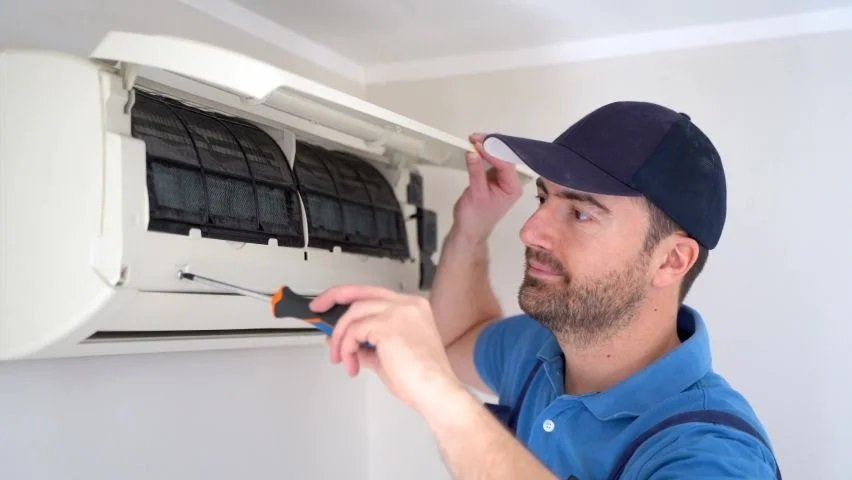Air conditioning has evolved from a luxury to a necessity in modern life. With advancements in technology and increasing climate concerns, it’s important to grasp how air conditioning works, its benefits, and how to maintain it effectively. This article delves into these aspects, offering a comprehensive overview for both novices and experts.
Fundamentals of Air Conditioning
At its core, air conditioning involves controlling the temperature, humidity, and air quality within an indoor space. This process is typically achieved through several key components:
- Evaporator Coil: This coil absorbs heat from the air inside your home.
- Condenser Coil: Located outside, this coil releases the absorbed heat into the environment.
- Compressor: This pump circulates the refrigerant between the evaporator and condenser coils.
- Expansion Valve: This component regulates the refrigerant flow into the evaporator coil.
The refrigerant, a substance that changes from liquid to gas at low temperatures, plays a crucial role in absorbing and releasing heat. When the refrigerant evaporates, it absorbs heat from indoor air. The gas then travels to the condenser coil, where it releases the heat and returns to a liquid state, ready to start the cycle again.
Types of Air Conditioning Systems
- Central Air Conditioning: This system cools your entire home using a network of ducts and vents. It’s ideal for maintaining a consistent temperature throughout large spaces.
- Split Systems: Comprising an indoor and outdoor unit, split systems are a popular choice for single rooms or smaller areas. They offer flexibility and are often used in homes without existing ductwork.
- Window Units: These are compact and designed to cool individual rooms. They are relatively affordable but less efficient for large areas.
- Portable Units: Portable air conditioners are versatile and can be moved from room to room. They are ideal for temporary cooling but may be less efficient than other types.
- Ductless Mini-Split Systems: These systems provide cooling without the need for ducts. They consist of an outdoor unit and one or more indoor units, offering flexibility and energy efficiency.
Benefits of Air Conditioning
1. Comfort: The primary benefit of air conditioning is comfort. By regulating indoor temperatures, air conditioning systems create a pleasant living environment regardless of the weather outside.
2. Improved Air Quality: Modern air conditioners often include air purifiers and filters that remove dust, allergens, and other pollutants from the air, enhancing indoor air quality.
3. Health Benefits: Air conditioning helps reduce the risk of heat-related illnesses by maintaining a stable and comfortable temperature, especially important for vulnerable populations like the elderly and young children.
4. Increased Productivity: In work environments, air conditioning can lead to increased productivity. Cooler temperatures can help reduce fatigue and improve concentration.
5. Protection of Belongings: Air conditioning helps prevent damage to furniture, electronics, and other household items that can be affected by high humidity and temperature fluctuations.
Energy Efficiency and Environmental Impact
As climate concerns grow, so does the emphasis on energy efficiency in air conditioning systems. Many modern systems are designed with energy-saving features to reduce electricity consumption and lower utility bills. Here are several important factors to consider:
1. SEER Ratings: The Seasonal Energy Efficiency Ratio (SEER) measures the cooling efficiency of air conditioners. Higher SEER ratings reflect improved efficiency. Choosing a system with a high SEER rating can lead to significant energy savings.
2. Programmable Thermostats: These devices allow you to set specific temperatures for different times of the day, optimizing energy use and reducing costs.
3. Regular Maintenance: Keeping your air conditioner well-maintained ensures it operates efficiently. This includes cleaning filters, checking refrigerant levels, and scheduling professional inspections.
4. Eco-Friendly Refrigerants: Newer air conditioning systems use refrigerants with lower global warming potential (GWP), helping to reduce their environmental impact.
Common Issues and Troubleshooting

Air conditioning systems can encounter several issues. Here are a few typical issues and their remedies:
1. Inconsistent Cooling: If your system isn’t cooling evenly, it could be due to a dirty filter, blocked vents, or issues with the thermostat. Check and clean filters regularly, ensure vents are unobstructed, and verify thermostat settings.
2. Noisy Operation: Unusual noises might indicate a problem with the fan, compressor, or other components. If the noise persists, it’s best to consult a professional technician.
3. *Poor Airflow: Weak airflow could be caused by a clogged air filter or issues with the ductwork. Replace filters as needed and inspect ducts for leaks or blockages.
4. System Leaks: Refrigerant leaks can impair the system’s efficiency and lead to higher energy bills. If you suspect a leak, contact a professional for repair.
The Future of Air Conditioning
The air conditioning industry is evolving rapidly, with innovations focusing on sustainability and smart technology. Future trends include:
1. Smart Air Conditioning: Integration with smart home systems allows for remote control and automation of temperature settings, improving convenience and energy efficiency.
2. Green Technology: Advances in refrigerants and energy sources aim to reduce the environmental impact of air conditioning systems. Solar-powered air conditioners and systems using natural refrigerants are on the rise.
3. Enhanced Energy Efficiency: Ongoing research into more efficient cooling technologies promises to further reduce energy consumption and operational costs.
Conclusion
Air conditioning has become an integral part of modern living, offering comfort, health benefits, and improved air quality. By understanding the different types of systems, their benefits, and how to maintain them, you can make informed decisions about your cooling needs. As technology advances, air conditioning will continue to evolve, offering even greater efficiency and environmental sustainability. Whether you’re upgrading an existing system or investing in a new one, staying informed about air conditioning trends and best practices will ensure you make the most of this essential technology.
